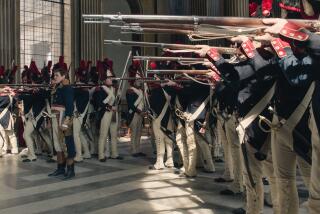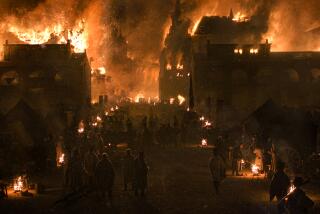Ere He Saw Elba : THE EMPEROR’S LAST STAND: A Journey to St. Helena <i> By Julia Blackburn (Pantheon Books: $22; 244 pp.) </i>
- Share via
When the island of Elba proved unable to hold the defeated Napoleon; when the Emperor came back to France, raised his army and obliged the Allies to fight at Waterloo, the British resolved to throw him away so definitively that he could not possibly return. They chose an eroded volcanic island, 10 miles long, in the south Atlantic. It was 1,600 miles from Brazil, 1,200 from Africa, and the nearest bit of footing was Ascension Island, another inhospitable rock and a 700-mile sail.
“St. Helena is farther away from anywhere else than anywhere else in the world,” Julia Blackburn writes. “The Emperor’s Last Stand”--a title as mournfully ironic as the rest of the book--is a quite unexpected look at one of those historical footnotes that are so classically familiar as to preclude thinking about, like King Charles’s oak tree or Lincoln’s stovepipe hat (he carried letters in it). To Blackburn, though, it was new (what are the English learning at school nowadays?); she knew little about Napoleon and thought St. Helena was somewhere in the Mediterranean.
She studied a small portion of the literature. More has been written about Napoleon, she tells us, than any other figure of the 19th Century. She spoke to Napoleonists. With her husband and children, she went to St. Helena, an 18-day sea trip from Britain, and spent a month in a rented cottage. It had to be that long, not because there was much to see, but because there was only one sailing a month.
What she was after was not scholarly material but fuel for an intuition. What she has produced is a resonant meditation on exile, fame, the stories we tell about ourselves; and the bigger stories we tell about our great figures, that clothe them with meaning in the same way a general’s uniform proclaims him a general. She writes about the formless pale creature inside the stories.
Is there a shade of incongruity in the seven-figure fee paid to an old man who not long ago was our president, and absent-minded at that, for making a speech in Japan? Is there another in the notion of Mikhail Gorbachev, who barely turns a head in Moscow today, being feted around the United States? What exactly is being paid for, or feted?
What was it exactly that 2,000 British soldiers were assembled to guard for the six years that Napoleon survived on his wind-swept south Atlantic rock? And the miniature court that attended him--a cook, a pastry cook, a lamplighter; and a general, a couple of noblemen and their wives who put on court dress and stood around each evening while Napoleon conducted conversation in the form of innumerable questions about whatever came to his idle and feverish mind--what was it they all were attending?
It was a torpid, middle-aged man, growing fat, who had to shove the clock hands along, minute by minute, because nothing whatever would ever happen to him again. There were three-hour baths, a half day spent looking at cloud formations, the organization of a garden; each of these non-activities being observed by the 2,000 soldiers and signaled to the island’s governor by means of flags. Even his newspapers were four months late. And the mansion that housed him was jerry-built, leaky and rat-invested; expanded and redesigned with military zeal and incompetence by the admiral in charge of his security. It was a mockery of empire, and at the same time, perhaps the truest representation of what empire means.
Blackburn gives us the details, though not overwhelmingly, of Napoleon’s life on the island, of his death, autopsy--bits were cut off for mementos--his elaborate burial, and even more elaborate exhuming years later, when France sent a royal delegation to transport the corpse to the Pantheon. She tells of tourists and souvenir hunters. She does not involve herself in theories about arsenic poisoning.
What gives the book its voice is not the details but the associations, the seemingly antic digressions that she weaves into them. She begins, for example, with a roadside accident in Spain. A car carrying a high-ranking Guardia Civil officer hits a truck; the officer is knocked unconscious. His subordinates pull him out of the car. It will be disrespectful simply to lay him by the roadside; instead, they walk him over, unconscious, so they can talk to the truck driver.
“There they stood for what seemed like an interminable length of time, in the heat of the day, with that heavy body hanging between them, the medals glinting lopsidedly in the sun, the socks exposed and the military hat balanced on a gently heaving chest,” she writes. The men carry him back to the car and stretch him out on the back seat. “It was tempting to think that for a brief moment I had seen the unconscious man open his eyes and stare incredulously at what was taking place, before lapsing back into an uneasy oblivion . . .
“And where is Napoleon in all this? He is there in the predicament of the concussed General: dressed in fine clothes, saturated with a smell of power and authority that is as pungent as the smell of a fox, and yet for the six final years of his life helplessly suspended out of time and history . . . “
One of the most suggestive sections describes Napoleon’s stay at the house of a hospitable English family while his permanent quarters were being readied and facilities for his 2,000 guards assembled. It was provisional and in that provisionality there was still hope. Napoleon sings and jokes with the family. He lets himself be pulled about by the children; particularly by Betsy, the younger daughter. She takes his sword and runs off with it, orders him around, plays cards and Blind Man’s Buff with him (he cheats). It is dream time; the dream of a lion who lets his mane be pulled because he will awake to find himself free. Napoleon awakes to find himself imprisoned for all time in his permanent jail.
Blackburn writes about the island’s volcanic beginnings, and its gradual forestation over the millennia. She writes about a Portuguese soldier, Fernando Lopez, mutilated for an offense, who jumps ship there early in the 16th Century. The sailors leave supplies for him; other ships leave him seeds and livestock.
Bit by bit, he turns the place into a garden where fruit, vegetables, pigs and goats multiply. Legends of this Adam and his Eden reach the Portuguese court. Lopez is sent for but soon asks to return. Later the island will be run by the British East India Company and worked as an agricultural “factory.” When Napoleon arrives, it has been leached out and worked to death. Eden has become a semi-desert.
Lopez, of course, is St. Helena’s true emperor. Napoleon was simply the relic of one. Blackburn, who writes hauntingly about all these things, writes with attractive flatness about her own visit, and how little there was to see. The island is as inglorious--and finally as touching--as the fat, middle-aged man who moldered there.
She ponders various ways of ending her reflections. The one I liked best imagines all the figures coming out on stage, at play’s end, and positioning themselves to receive applause. There are Lopez, the British soldiers, the petulant English governor, the French courtiers and pastry cooks. Finally, out comes Napoleon, and out comes the island, made of papier mache with houses and trees painted on it, and worn by an actor peering through the eye-holes. Napoleon bows, the island bows.
More to Read
Sign up for our Book Club newsletter
Get the latest news, events and more from the Los Angeles Times Book Club, and help us get L.A. reading and talking.
You may occasionally receive promotional content from the Los Angeles Times.










